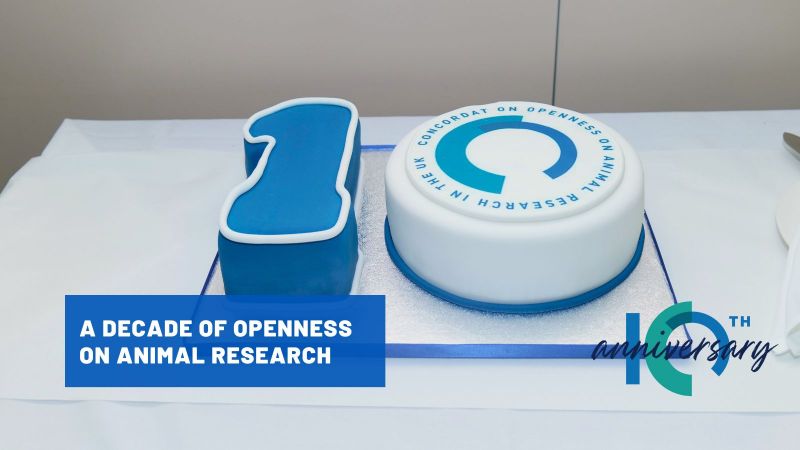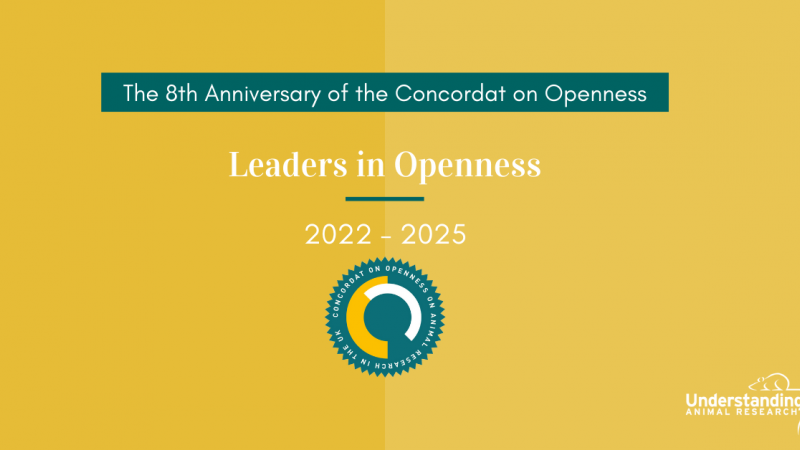
University of Bristol and AstraZeneca announced as latest Leaders in Openness
Understanding Animal Research is delighted to announce that the University of Bristol and AstraZeneca have been granted Leader in Openness status. The University of Bristol joins 11 other publicly funded research institutions, while AstraZeneca is the first pharmaceutical company to be granted Leader in Openness status within the commercial category.
The Concordat on Openness on Animal Research is a publicly accountable pledge that commits its signatories to be open with the public about how, why and when they use animals in scientific, medical, and veterinary research. This May we celebrated a decade since the launch of the Concordat in the UK,
Leaders in Openness was introduced in 2019 to recognise the organisations that are at the forefront of driving openness forward, committing considerable resources and energy to following best practice, and making the aims of the Concordat a reality. While every Concordat signatory is on their own openness journey, Leaders in Openness play an important role to moving conversations about the use of animals in research forward and embedding change in the bioscience sector. Leaders in Openness act as models for other organisations and, by sharing their practices more widely, we aim to support and inspire similar efforts in many other organisations.
Concordat signatories must submit an application detailing how they are engaging with the public, the media, and internal stakeholders on animal research, to be considered for Leaders in Openness. The application process factors in the relevant sector (publicly funded research, commercial, funder, and membership organisation), and submissions are assessed by public and peer reviewers.
Publicly funded Concordat signatories have been at the forefront of openness when it comes to the amount of animal research information being made publicly available online. The University of Bristol joins the leading organisations with a well-designed and accessible website offering case studies, animal use statistics, images, and AWERB minutes. The university has also demonstrated an excellent approach to engaging with the public, staff and students, and the media.
Lucinda Parr, Chief Operating Officer and Registrar at the University of Bristol, said:
“We recognise there are many differing views about the use of animals in research which is why it is so important for us to explain to the public how and why we do this and clearly set out the steps we take to ensure the highest standards of animal welfare. This recognition not only highlights our commitment to public transparency and the ethical treatment of animals. It is also testament to the dedication of our researchers who advocate for openness and best practice in this area.”
Commercial companies such as AstraZeneca face challenges when it comes to public communications. Commercial sensitives, questions of intellectual property rights, and the concerns of global marketing, brand and legal teams must all be taken into account. Despite these barriers, AstraZeneca has demonstrated just what can be achieved within the pharmaceutical sector with a website that explains why animals are needed as part of the drug discovery and development process, sets out AstraZeneca’s commitment to animal welfare and application of the 3Rs, and provides an FAQ that gives further information including animal use statistics. The public-facing website is supported by an exemplary programme of internal engagement which includes comprehensive resources, support for running openness events, lab tours, openness awards, and workplace social media.
On receiving Leaders in Openness status, a spokesperson for AstraZeneca said:
“AstraZeneca is committed to sustainable science and transparency, and our openness about the role of animals in biomedical research alongside our continuing efforts to Replace, Reduce and Refine animal use in research is an important part of this commitment.”
Hannah Hobson, Head of Communications and Engagement for Understanding Animal Research, said:
“Leaders in Openness allows us to recognise the Concordat signatories that are making special efforts to drive openness forward and setting an example to others in the sector. Ten years ago, when the Concordat first launched, information about animal research wasn’t readily available online and organisations weren’t talking to staff or journalists about this work, but thanks to organisations such as these, this has changed radically. These leading organisations are crucial for pushing the UK bioscience sector towards greater openness and providing the public with information about why, how and when animals are used in research. The University of Bristol joins an impressive list of UK universities leading openness in animal research. AstraZeneca is the first pharmaceutical company to be recognised for its leading openness work, which we hope will act as an inspiration for other commercial organisations.”
Congratulations to the University of Bristol and AstraZeneca, who join the following list of Leaders in Openness:
Leaders in Openness 2022-2025:
Agenda Life Sciences
The Babraham Institute
The Francis Crick Institute
Imperial College London
The Institute of Cancer Research
Newcastle University
The Pirbright Institute
Royal Veterinary College
University of Bath
University of Cambridge
University of Leicester
University of Manchester
Leaders in Openness 2023-2026
Last edited: 29 November 2024 12:33



